Bachelor of Nursing: NSG2202 Mental Health - Depression Report
VerifiedAdded on 2022/10/04
|13
|2595
|25
Report
AI Summary
This report provides a comprehensive overview of depression, a significant mental illness. It begins by defining depression and its clinical manifestations, including symptoms in adults, children, and older adults. The report delves into the psychopathology of depression, exploring biochemical causes and the role of neurotransmitters. It then discusses the use of psychopharmacology, specifically antidepressant medications, and details the patient education necessary regarding these medications, including side effects and expected timelines for improvement. Furthermore, the report outlines various treatment options, including psychotherapy (such as interpersonal therapy and cognitive behavioral therapy) and electroconvulsive therapy (ECT), highlighting their roles in managing depression. The report concludes by summarizing the key findings and emphasizes the multifaceted approach required for effective depression management.
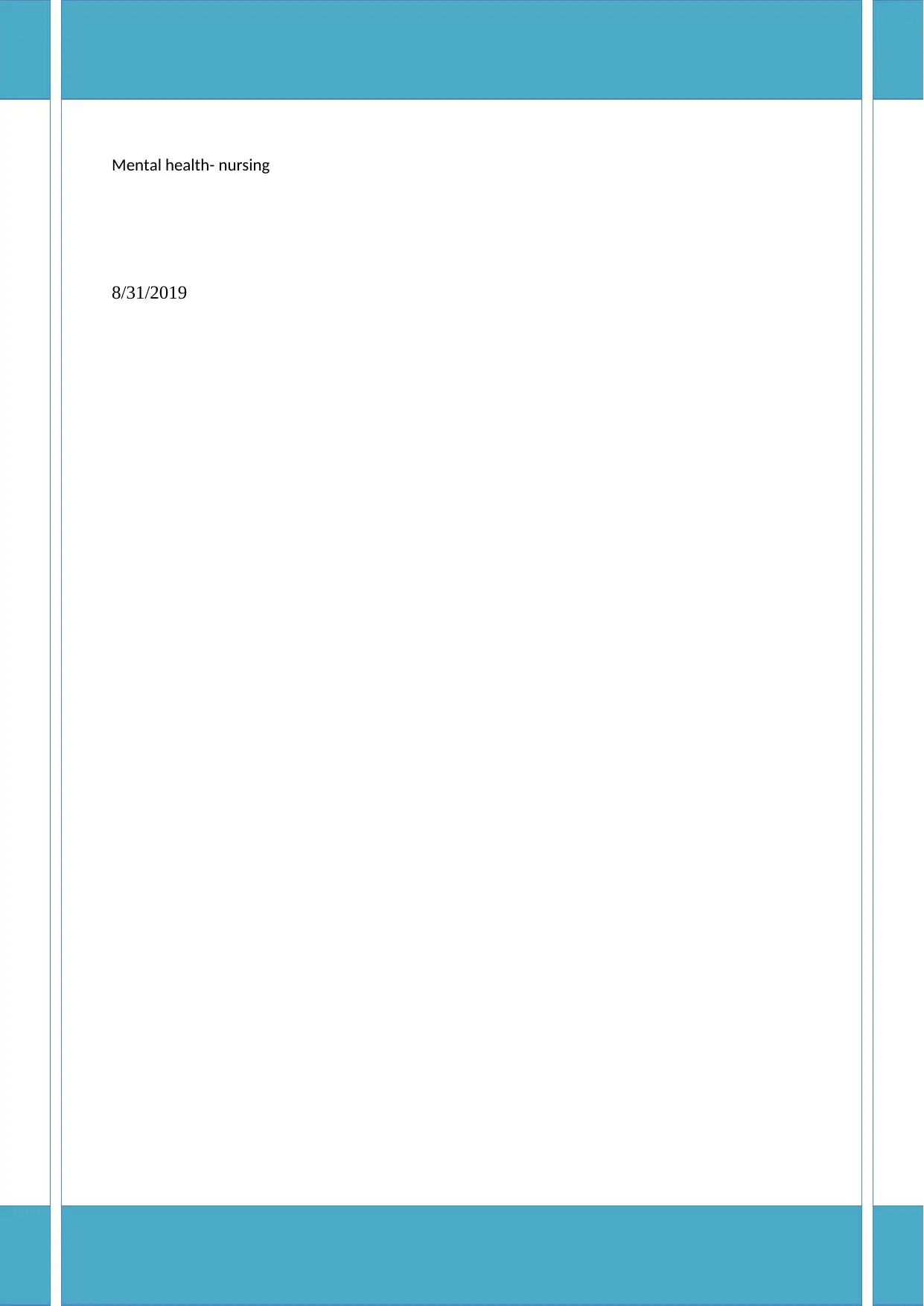
Mental health- nursing
8/31/2019
8/31/2019
Paraphrase This Document
Need a fresh take? Get an instant paraphrase of this document with our AI Paraphraser
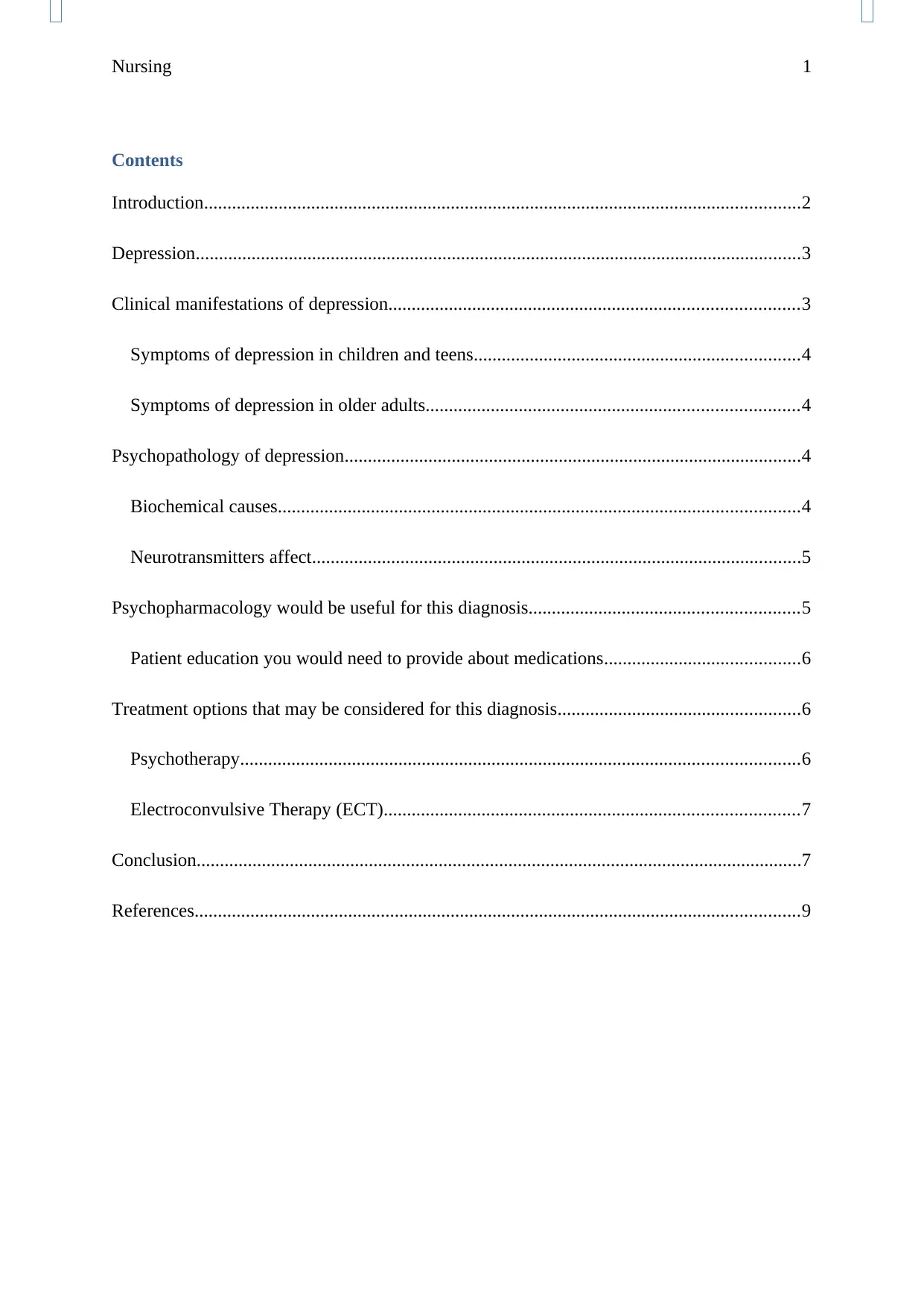
Nursing 1
Contents
Introduction................................................................................................................................2
Depression..................................................................................................................................3
Clinical manifestations of depression........................................................................................3
Symptoms of depression in children and teens......................................................................4
Symptoms of depression in older adults................................................................................4
Psychopathology of depression..................................................................................................4
Biochemical causes................................................................................................................4
Neurotransmitters affect.........................................................................................................5
Psychopharmacology would be useful for this diagnosis..........................................................5
Patient education you would need to provide about medications..........................................6
Treatment options that may be considered for this diagnosis....................................................6
Psychotherapy........................................................................................................................6
Electroconvulsive Therapy (ECT).........................................................................................7
Conclusion..................................................................................................................................7
References..................................................................................................................................9
Contents
Introduction................................................................................................................................2
Depression..................................................................................................................................3
Clinical manifestations of depression........................................................................................3
Symptoms of depression in children and teens......................................................................4
Symptoms of depression in older adults................................................................................4
Psychopathology of depression..................................................................................................4
Biochemical causes................................................................................................................4
Neurotransmitters affect.........................................................................................................5
Psychopharmacology would be useful for this diagnosis..........................................................5
Patient education you would need to provide about medications..........................................6
Treatment options that may be considered for this diagnosis....................................................6
Psychotherapy........................................................................................................................6
Electroconvulsive Therapy (ECT).........................................................................................7
Conclusion..................................................................................................................................7
References..................................................................................................................................9
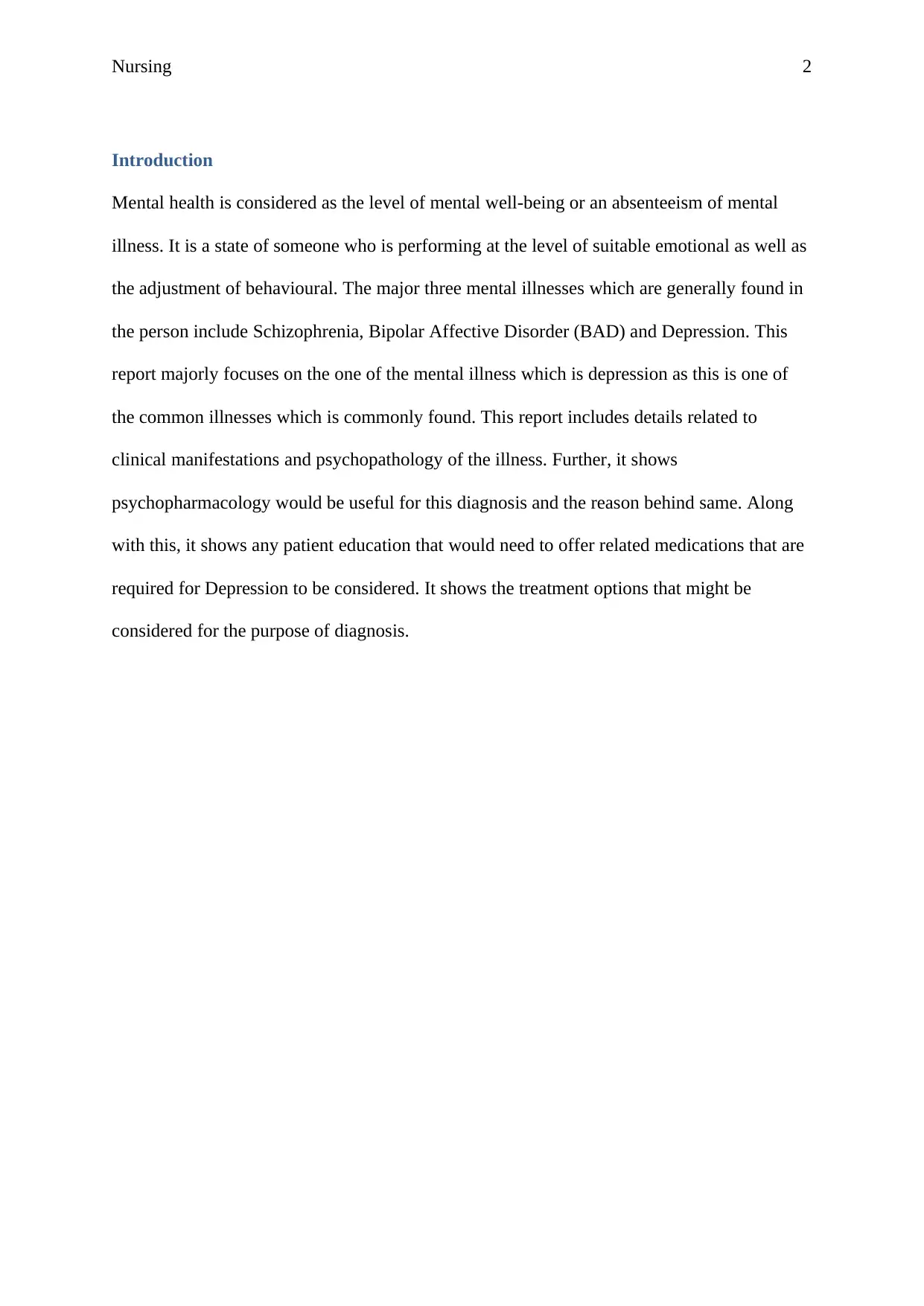
Nursing 2
Introduction
Mental health is considered as the level of mental well-being or an absenteeism of mental
illness. It is a state of someone who is performing at the level of suitable emotional as well as
the adjustment of behavioural. The major three mental illnesses which are generally found in
the person include Schizophrenia, Bipolar Affective Disorder (BAD) and Depression. This
report majorly focuses on the one of the mental illness which is depression as this is one of
the common illnesses which is commonly found. This report includes details related to
clinical manifestations and psychopathology of the illness. Further, it shows
psychopharmacology would be useful for this diagnosis and the reason behind same. Along
with this, it shows any patient education that would need to offer related medications that are
required for Depression to be considered. It shows the treatment options that might be
considered for the purpose of diagnosis.
Introduction
Mental health is considered as the level of mental well-being or an absenteeism of mental
illness. It is a state of someone who is performing at the level of suitable emotional as well as
the adjustment of behavioural. The major three mental illnesses which are generally found in
the person include Schizophrenia, Bipolar Affective Disorder (BAD) and Depression. This
report majorly focuses on the one of the mental illness which is depression as this is one of
the common illnesses which is commonly found. This report includes details related to
clinical manifestations and psychopathology of the illness. Further, it shows
psychopharmacology would be useful for this diagnosis and the reason behind same. Along
with this, it shows any patient education that would need to offer related medications that are
required for Depression to be considered. It shows the treatment options that might be
considered for the purpose of diagnosis.
⊘ This is a preview!⊘
Do you want full access?
Subscribe today to unlock all pages.

Trusted by 1+ million students worldwide
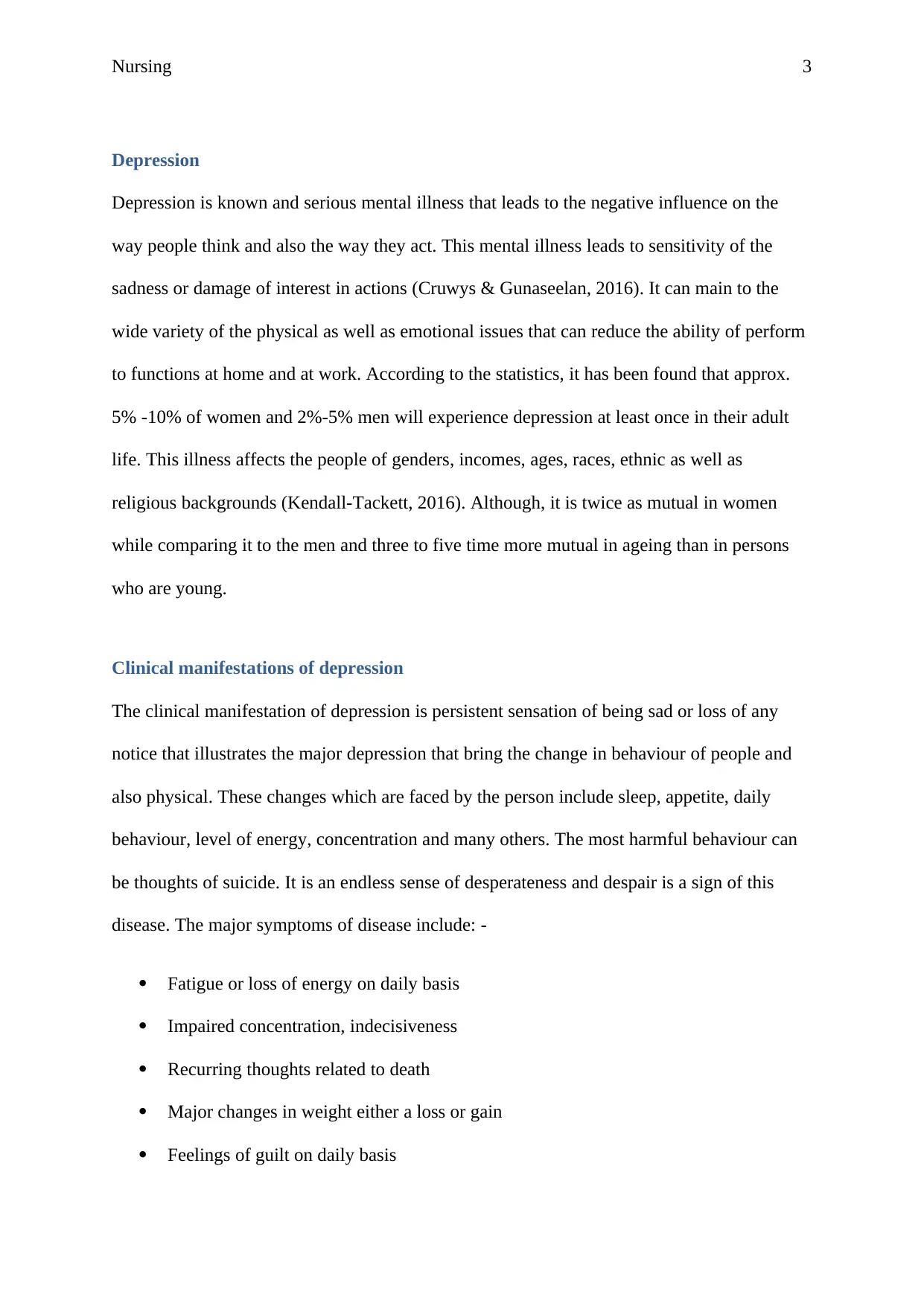
Nursing 3
Depression
Depression is known and serious mental illness that leads to the negative influence on the
way people think and also the way they act. This mental illness leads to sensitivity of the
sadness or damage of interest in actions (Cruwys & Gunaseelan, 2016). It can main to the
wide variety of the physical as well as emotional issues that can reduce the ability of perform
to functions at home and at work. According to the statistics, it has been found that approx.
5% -10% of women and 2%-5% men will experience depression at least once in their adult
life. This illness affects the people of genders, incomes, ages, races, ethnic as well as
religious backgrounds (Kendall-Tackett, 2016). Although, it is twice as mutual in women
while comparing it to the men and three to five time more mutual in ageing than in persons
who are young.
Clinical manifestations of depression
The clinical manifestation of depression is persistent sensation of being sad or loss of any
notice that illustrates the major depression that bring the change in behaviour of people and
also physical. These changes which are faced by the person include sleep, appetite, daily
behaviour, level of energy, concentration and many others. The most harmful behaviour can
be thoughts of suicide. It is an endless sense of desperateness and despair is a sign of this
disease. The major symptoms of disease include: -
Fatigue or loss of energy on daily basis
Impaired concentration, indecisiveness
Recurring thoughts related to death
Major changes in weight either a loss or gain
Feelings of guilt on daily basis
Depression
Depression is known and serious mental illness that leads to the negative influence on the
way people think and also the way they act. This mental illness leads to sensitivity of the
sadness or damage of interest in actions (Cruwys & Gunaseelan, 2016). It can main to the
wide variety of the physical as well as emotional issues that can reduce the ability of perform
to functions at home and at work. According to the statistics, it has been found that approx.
5% -10% of women and 2%-5% men will experience depression at least once in their adult
life. This illness affects the people of genders, incomes, ages, races, ethnic as well as
religious backgrounds (Kendall-Tackett, 2016). Although, it is twice as mutual in women
while comparing it to the men and three to five time more mutual in ageing than in persons
who are young.
Clinical manifestations of depression
The clinical manifestation of depression is persistent sensation of being sad or loss of any
notice that illustrates the major depression that bring the change in behaviour of people and
also physical. These changes which are faced by the person include sleep, appetite, daily
behaviour, level of energy, concentration and many others. The most harmful behaviour can
be thoughts of suicide. It is an endless sense of desperateness and despair is a sign of this
disease. The major symptoms of disease include: -
Fatigue or loss of energy on daily basis
Impaired concentration, indecisiveness
Recurring thoughts related to death
Major changes in weight either a loss or gain
Feelings of guilt on daily basis
Paraphrase This Document
Need a fresh take? Get an instant paraphrase of this document with our AI Paraphraser
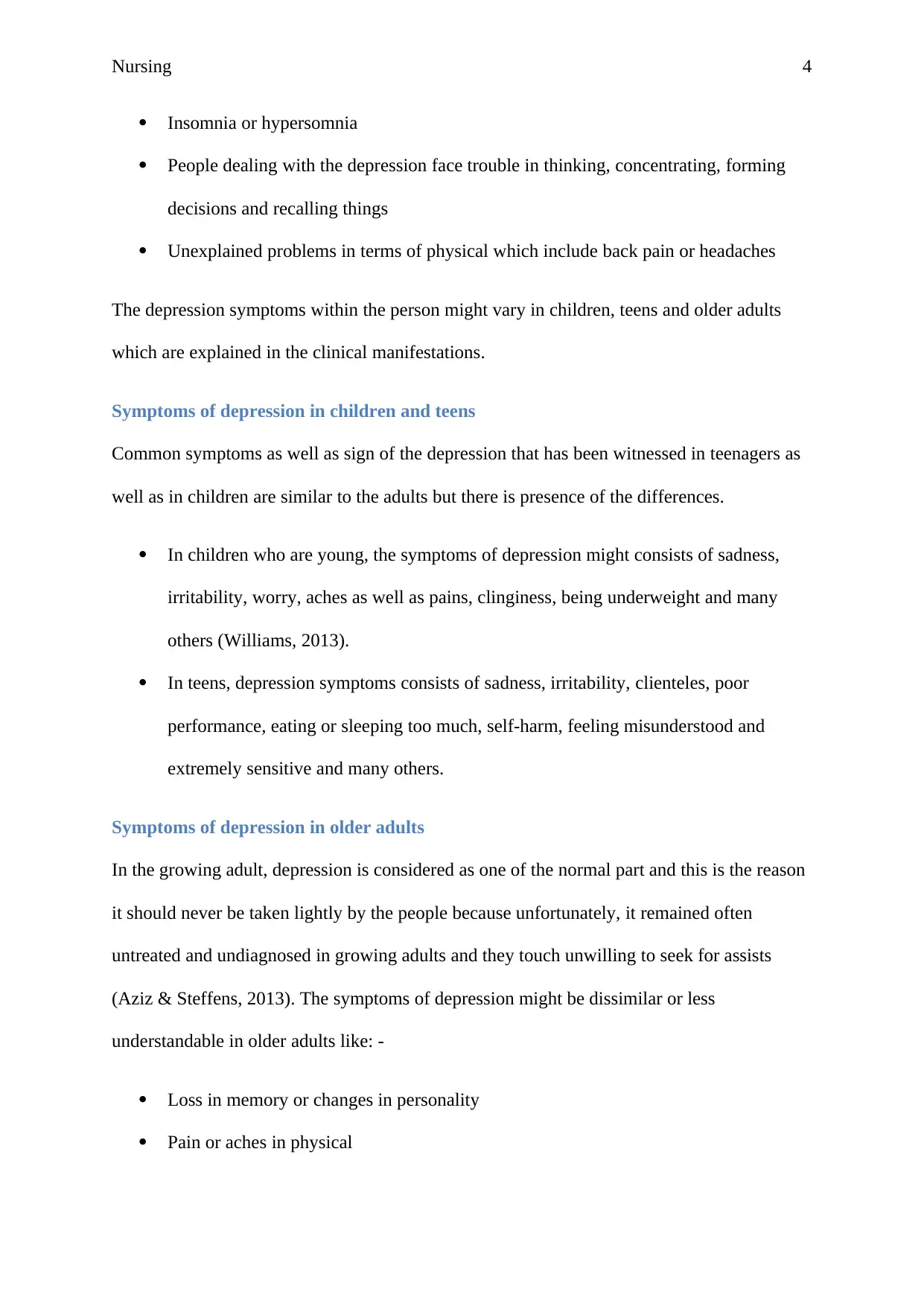
Nursing 4
Insomnia or hypersomnia
People dealing with the depression face trouble in thinking, concentrating, forming
decisions and recalling things
Unexplained problems in terms of physical which include back pain or headaches
The depression symptoms within the person might vary in children, teens and older adults
which are explained in the clinical manifestations.
Symptoms of depression in children and teens
Common symptoms as well as sign of the depression that has been witnessed in teenagers as
well as in children are similar to the adults but there is presence of the differences.
In children who are young, the symptoms of depression might consists of sadness,
irritability, worry, aches as well as pains, clinginess, being underweight and many
others (Williams, 2013).
In teens, depression symptoms consists of sadness, irritability, clienteles, poor
performance, eating or sleeping too much, self-harm, feeling misunderstood and
extremely sensitive and many others.
Symptoms of depression in older adults
In the growing adult, depression is considered as one of the normal part and this is the reason
it should never be taken lightly by the people because unfortunately, it remained often
untreated and undiagnosed in growing adults and they touch unwilling to seek for assists
(Aziz & Steffens, 2013). The symptoms of depression might be dissimilar or less
understandable in older adults like: -
Loss in memory or changes in personality
Pain or aches in physical
Insomnia or hypersomnia
People dealing with the depression face trouble in thinking, concentrating, forming
decisions and recalling things
Unexplained problems in terms of physical which include back pain or headaches
The depression symptoms within the person might vary in children, teens and older adults
which are explained in the clinical manifestations.
Symptoms of depression in children and teens
Common symptoms as well as sign of the depression that has been witnessed in teenagers as
well as in children are similar to the adults but there is presence of the differences.
In children who are young, the symptoms of depression might consists of sadness,
irritability, worry, aches as well as pains, clinginess, being underweight and many
others (Williams, 2013).
In teens, depression symptoms consists of sadness, irritability, clienteles, poor
performance, eating or sleeping too much, self-harm, feeling misunderstood and
extremely sensitive and many others.
Symptoms of depression in older adults
In the growing adult, depression is considered as one of the normal part and this is the reason
it should never be taken lightly by the people because unfortunately, it remained often
untreated and undiagnosed in growing adults and they touch unwilling to seek for assists
(Aziz & Steffens, 2013). The symptoms of depression might be dissimilar or less
understandable in older adults like: -
Loss in memory or changes in personality
Pain or aches in physical
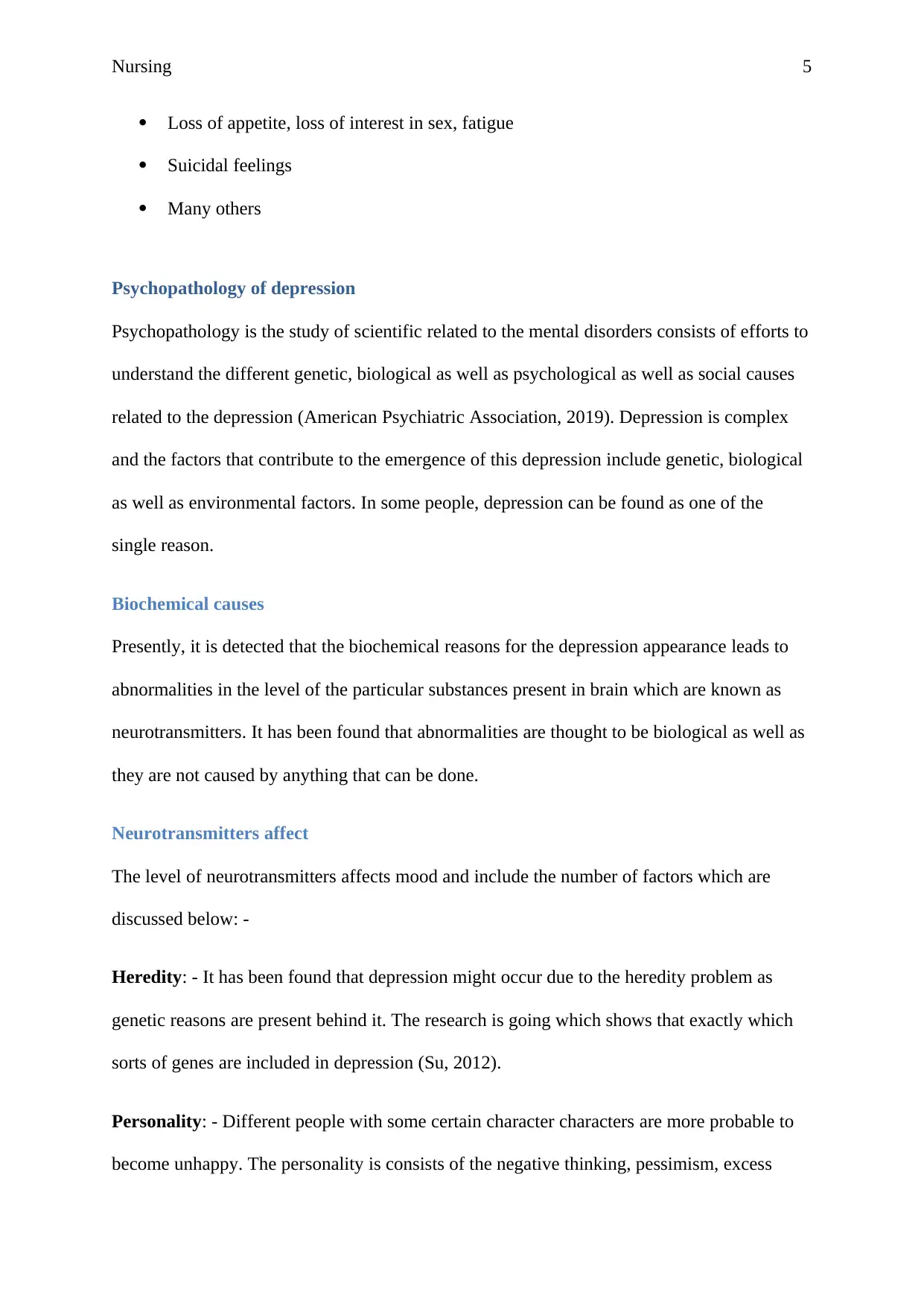
Nursing 5
Loss of appetite, loss of interest in sex, fatigue
Suicidal feelings
Many others
Psychopathology of depression
Psychopathology is the study of scientific related to the mental disorders consists of efforts to
understand the different genetic, biological as well as psychological as well as social causes
related to the depression (American Psychiatric Association, 2019). Depression is complex
and the factors that contribute to the emergence of this depression include genetic, biological
as well as environmental factors. In some people, depression can be found as one of the
single reason.
Biochemical causes
Presently, it is detected that the biochemical reasons for the depression appearance leads to
abnormalities in the level of the particular substances present in brain which are known as
neurotransmitters. It has been found that abnormalities are thought to be biological as well as
they are not caused by anything that can be done.
Neurotransmitters affect
The level of neurotransmitters affects mood and include the number of factors which are
discussed below: -
Heredity: - It has been found that depression might occur due to the heredity problem as
genetic reasons are present behind it. The research is going which shows that exactly which
sorts of genes are included in depression (Su, 2012).
Personality: - Different people with some certain character characters are more probable to
become unhappy. The personality is consists of the negative thinking, pessimism, excess
Loss of appetite, loss of interest in sex, fatigue
Suicidal feelings
Many others
Psychopathology of depression
Psychopathology is the study of scientific related to the mental disorders consists of efforts to
understand the different genetic, biological as well as psychological as well as social causes
related to the depression (American Psychiatric Association, 2019). Depression is complex
and the factors that contribute to the emergence of this depression include genetic, biological
as well as environmental factors. In some people, depression can be found as one of the
single reason.
Biochemical causes
Presently, it is detected that the biochemical reasons for the depression appearance leads to
abnormalities in the level of the particular substances present in brain which are known as
neurotransmitters. It has been found that abnormalities are thought to be biological as well as
they are not caused by anything that can be done.
Neurotransmitters affect
The level of neurotransmitters affects mood and include the number of factors which are
discussed below: -
Heredity: - It has been found that depression might occur due to the heredity problem as
genetic reasons are present behind it. The research is going which shows that exactly which
sorts of genes are included in depression (Su, 2012).
Personality: - Different people with some certain character characters are more probable to
become unhappy. The personality is consists of the negative thinking, pessimism, excess
⊘ This is a preview!⊘
Do you want full access?
Subscribe today to unlock all pages.

Trusted by 1+ million students worldwide
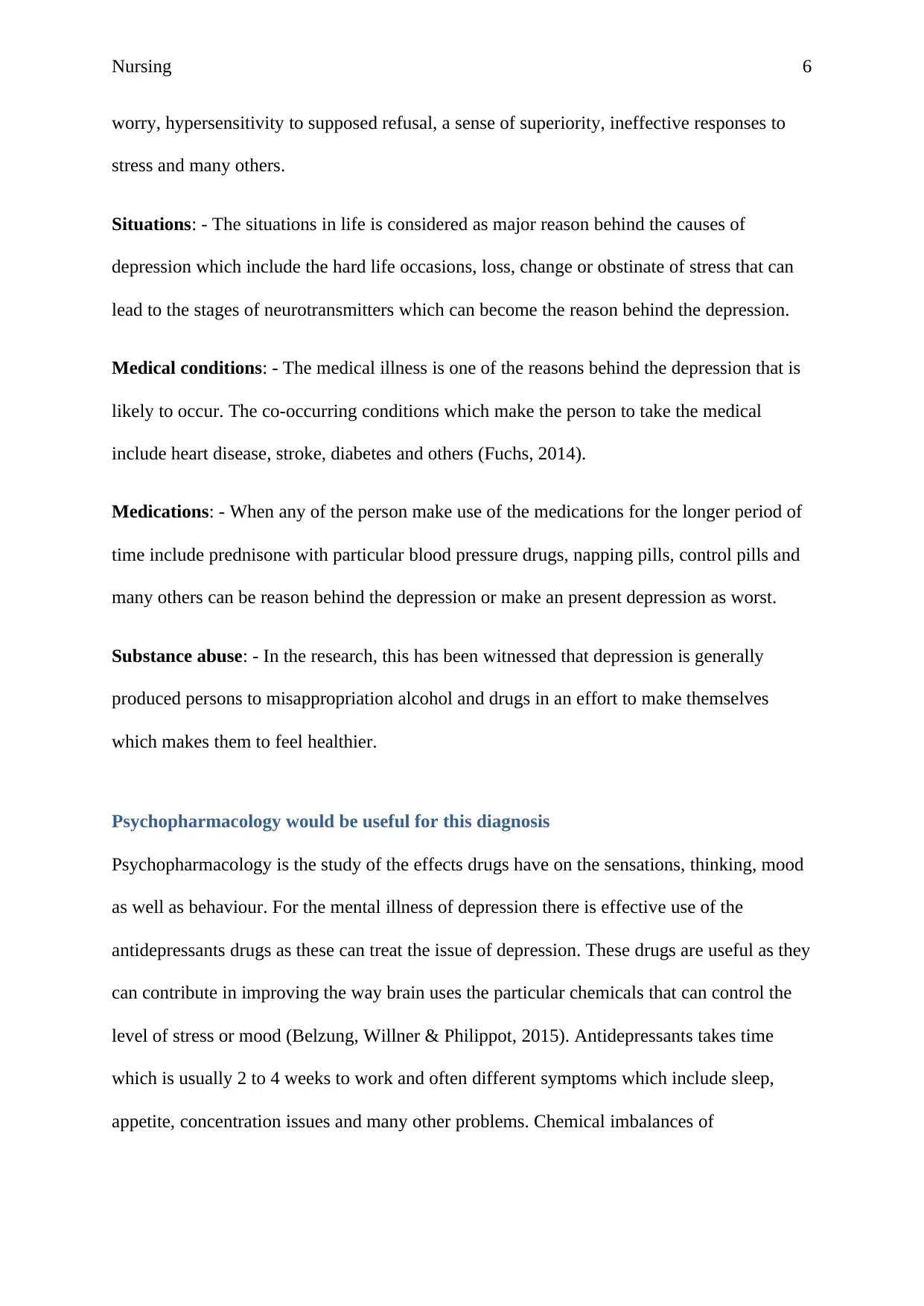
Nursing 6
worry, hypersensitivity to supposed refusal, a sense of superiority, ineffective responses to
stress and many others.
Situations: - The situations in life is considered as major reason behind the causes of
depression which include the hard life occasions, loss, change or obstinate of stress that can
lead to the stages of neurotransmitters which can become the reason behind the depression.
Medical conditions: - The medical illness is one of the reasons behind the depression that is
likely to occur. The co-occurring conditions which make the person to take the medical
include heart disease, stroke, diabetes and others (Fuchs, 2014).
Medications: - When any of the person make use of the medications for the longer period of
time include prednisone with particular blood pressure drugs, napping pills, control pills and
many others can be reason behind the depression or make an present depression as worst.
Substance abuse: - In the research, this has been witnessed that depression is generally
produced persons to misappropriation alcohol and drugs in an effort to make themselves
which makes them to feel healthier.
Psychopharmacology would be useful for this diagnosis
Psychopharmacology is the study of the effects drugs have on the sensations, thinking, mood
as well as behaviour. For the mental illness of depression there is effective use of the
antidepressants drugs as these can treat the issue of depression. These drugs are useful as they
can contribute in improving the way brain uses the particular chemicals that can control the
level of stress or mood (Belzung, Willner & Philippot, 2015). Antidepressants takes time
which is usually 2 to 4 weeks to work and often different symptoms which include sleep,
appetite, concentration issues and many other problems. Chemical imbalances of
worry, hypersensitivity to supposed refusal, a sense of superiority, ineffective responses to
stress and many others.
Situations: - The situations in life is considered as major reason behind the causes of
depression which include the hard life occasions, loss, change or obstinate of stress that can
lead to the stages of neurotransmitters which can become the reason behind the depression.
Medical conditions: - The medical illness is one of the reasons behind the depression that is
likely to occur. The co-occurring conditions which make the person to take the medical
include heart disease, stroke, diabetes and others (Fuchs, 2014).
Medications: - When any of the person make use of the medications for the longer period of
time include prednisone with particular blood pressure drugs, napping pills, control pills and
many others can be reason behind the depression or make an present depression as worst.
Substance abuse: - In the research, this has been witnessed that depression is generally
produced persons to misappropriation alcohol and drugs in an effort to make themselves
which makes them to feel healthier.
Psychopharmacology would be useful for this diagnosis
Psychopharmacology is the study of the effects drugs have on the sensations, thinking, mood
as well as behaviour. For the mental illness of depression there is effective use of the
antidepressants drugs as these can treat the issue of depression. These drugs are useful as they
can contribute in improving the way brain uses the particular chemicals that can control the
level of stress or mood (Belzung, Willner & Philippot, 2015). Antidepressants takes time
which is usually 2 to 4 weeks to work and often different symptoms which include sleep,
appetite, concentration issues and many other problems. Chemical imbalances of
Paraphrase This Document
Need a fresh take? Get an instant paraphrase of this document with our AI Paraphraser
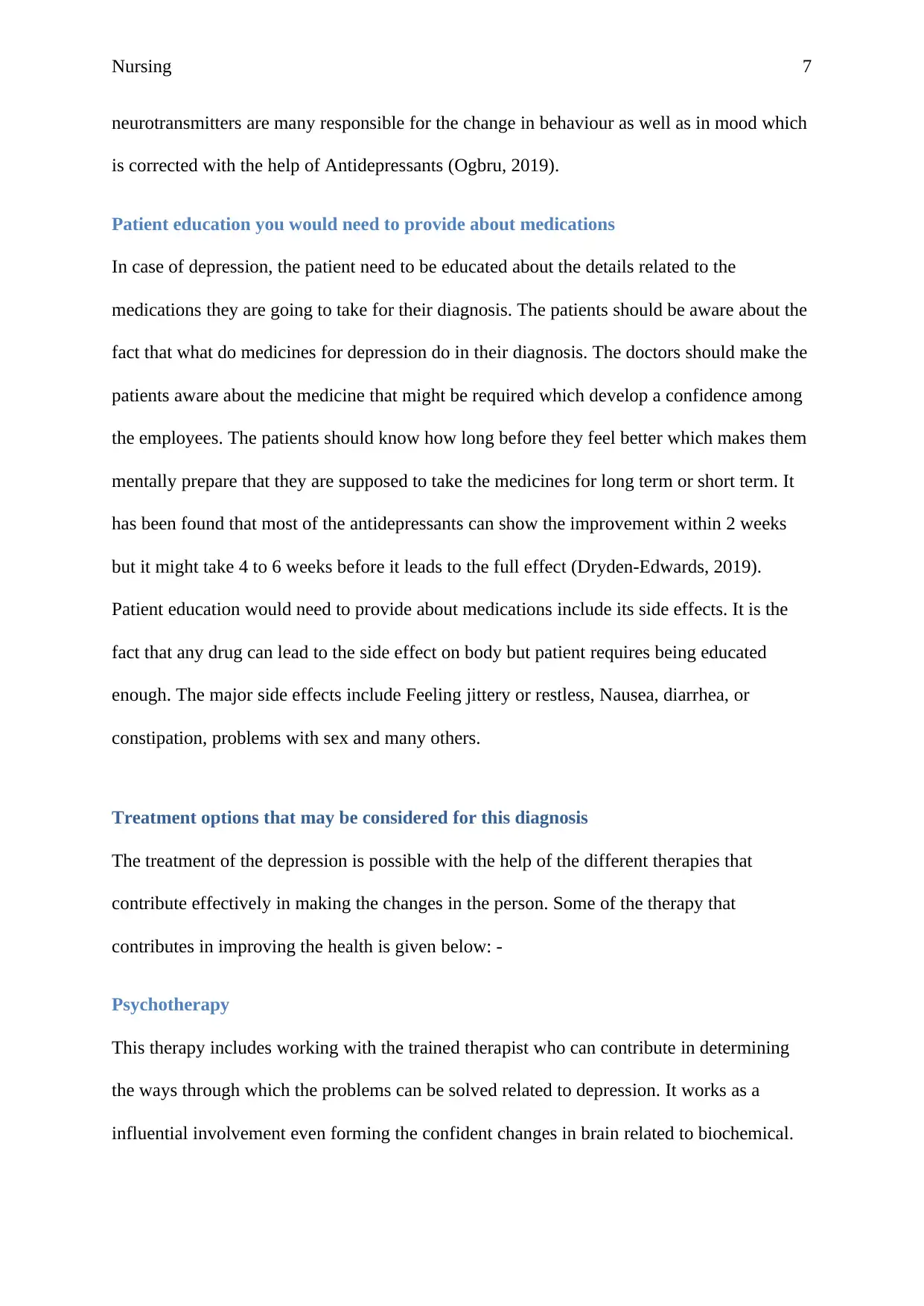
Nursing 7
neurotransmitters are many responsible for the change in behaviour as well as in mood which
is corrected with the help of Antidepressants (Ogbru, 2019).
Patient education you would need to provide about medications
In case of depression, the patient need to be educated about the details related to the
medications they are going to take for their diagnosis. The patients should be aware about the
fact that what do medicines for depression do in their diagnosis. The doctors should make the
patients aware about the medicine that might be required which develop a confidence among
the employees. The patients should know how long before they feel better which makes them
mentally prepare that they are supposed to take the medicines for long term or short term. It
has been found that most of the antidepressants can show the improvement within 2 weeks
but it might take 4 to 6 weeks before it leads to the full effect (Dryden-Edwards, 2019).
Patient education would need to provide about medications include its side effects. It is the
fact that any drug can lead to the side effect on body but patient requires being educated
enough. The major side effects include Feeling jittery or restless, Nausea, diarrhea, or
constipation, problems with sex and many others.
Treatment options that may be considered for this diagnosis
The treatment of the depression is possible with the help of the different therapies that
contribute effectively in making the changes in the person. Some of the therapy that
contributes in improving the health is given below: -
Psychotherapy
This therapy includes working with the trained therapist who can contribute in determining
the ways through which the problems can be solved related to depression. It works as a
influential involvement even forming the confident changes in brain related to biochemical.
neurotransmitters are many responsible for the change in behaviour as well as in mood which
is corrected with the help of Antidepressants (Ogbru, 2019).
Patient education you would need to provide about medications
In case of depression, the patient need to be educated about the details related to the
medications they are going to take for their diagnosis. The patients should be aware about the
fact that what do medicines for depression do in their diagnosis. The doctors should make the
patients aware about the medicine that might be required which develop a confidence among
the employees. The patients should know how long before they feel better which makes them
mentally prepare that they are supposed to take the medicines for long term or short term. It
has been found that most of the antidepressants can show the improvement within 2 weeks
but it might take 4 to 6 weeks before it leads to the full effect (Dryden-Edwards, 2019).
Patient education would need to provide about medications include its side effects. It is the
fact that any drug can lead to the side effect on body but patient requires being educated
enough. The major side effects include Feeling jittery or restless, Nausea, diarrhea, or
constipation, problems with sex and many others.
Treatment options that may be considered for this diagnosis
The treatment of the depression is possible with the help of the different therapies that
contribute effectively in making the changes in the person. Some of the therapy that
contributes in improving the health is given below: -
Psychotherapy
This therapy includes working with the trained therapist who can contribute in determining
the ways through which the problems can be solved related to depression. It works as a
influential involvement even forming the confident changes in brain related to biochemical.
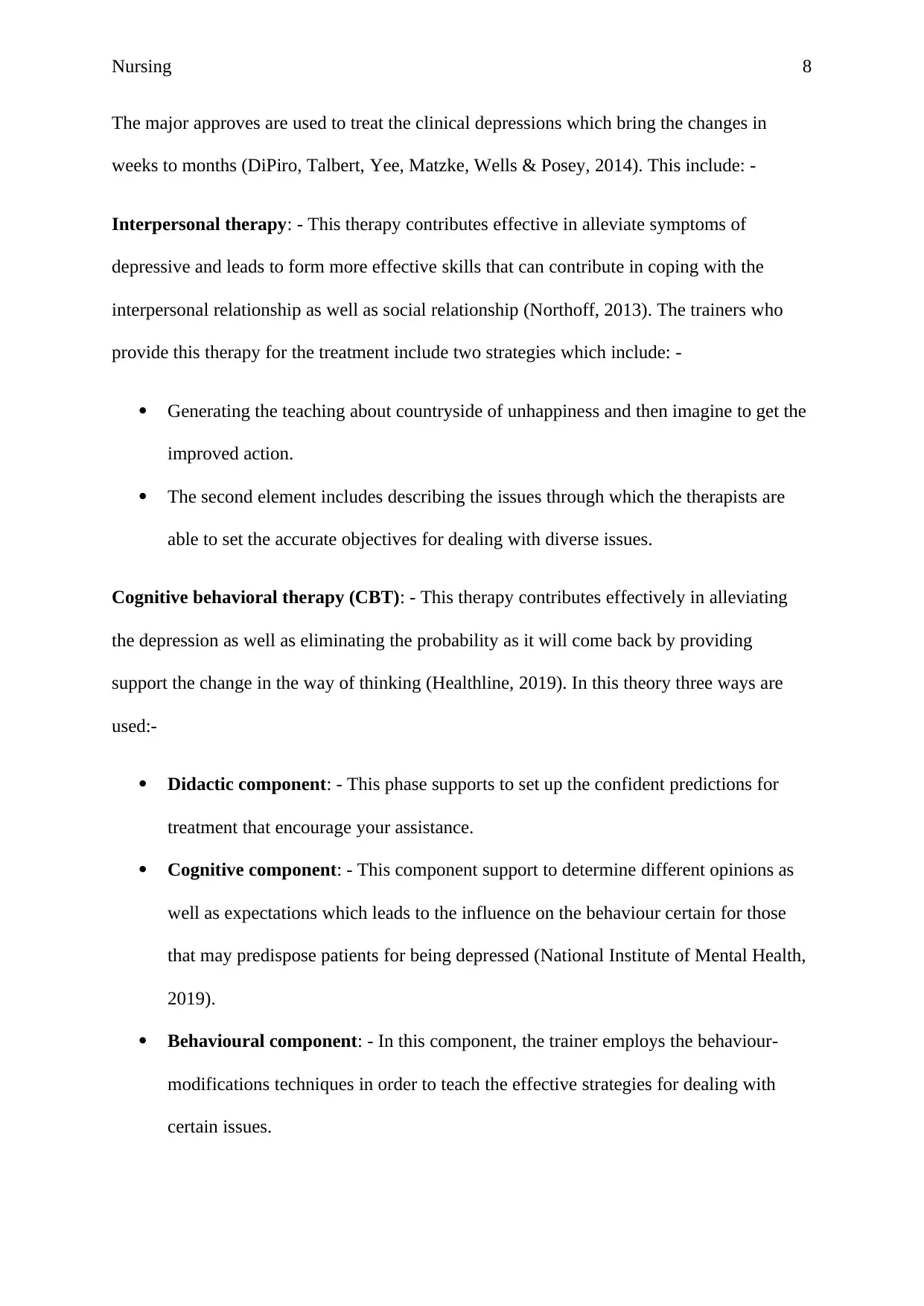
Nursing 8
The major approves are used to treat the clinical depressions which bring the changes in
weeks to months (DiPiro, Talbert, Yee, Matzke, Wells & Posey, 2014). This include: -
Interpersonal therapy: - This therapy contributes effective in alleviate symptoms of
depressive and leads to form more effective skills that can contribute in coping with the
interpersonal relationship as well as social relationship (Northoff, 2013). The trainers who
provide this therapy for the treatment include two strategies which include: -
Generating the teaching about countryside of unhappiness and then imagine to get the
improved action.
The second element includes describing the issues through which the therapists are
able to set the accurate objectives for dealing with diverse issues.
Cognitive behavioral therapy (CBT): - This therapy contributes effectively in alleviating
the depression as well as eliminating the probability as it will come back by providing
support the change in the way of thinking (Healthline, 2019). In this theory three ways are
used:-
Didactic component: - This phase supports to set up the confident predictions for
treatment that encourage your assistance.
Cognitive component: - This component support to determine different opinions as
well as expectations which leads to the influence on the behaviour certain for those
that may predispose patients for being depressed (National Institute of Mental Health,
2019).
Behavioural component: - In this component, the trainer employs the behaviour-
modifications techniques in order to teach the effective strategies for dealing with
certain issues.
The major approves are used to treat the clinical depressions which bring the changes in
weeks to months (DiPiro, Talbert, Yee, Matzke, Wells & Posey, 2014). This include: -
Interpersonal therapy: - This therapy contributes effective in alleviate symptoms of
depressive and leads to form more effective skills that can contribute in coping with the
interpersonal relationship as well as social relationship (Northoff, 2013). The trainers who
provide this therapy for the treatment include two strategies which include: -
Generating the teaching about countryside of unhappiness and then imagine to get the
improved action.
The second element includes describing the issues through which the therapists are
able to set the accurate objectives for dealing with diverse issues.
Cognitive behavioral therapy (CBT): - This therapy contributes effectively in alleviating
the depression as well as eliminating the probability as it will come back by providing
support the change in the way of thinking (Healthline, 2019). In this theory three ways are
used:-
Didactic component: - This phase supports to set up the confident predictions for
treatment that encourage your assistance.
Cognitive component: - This component support to determine different opinions as
well as expectations which leads to the influence on the behaviour certain for those
that may predispose patients for being depressed (National Institute of Mental Health,
2019).
Behavioural component: - In this component, the trainer employs the behaviour-
modifications techniques in order to teach the effective strategies for dealing with
certain issues.
⊘ This is a preview!⊘
Do you want full access?
Subscribe today to unlock all pages.

Trusted by 1+ million students worldwide
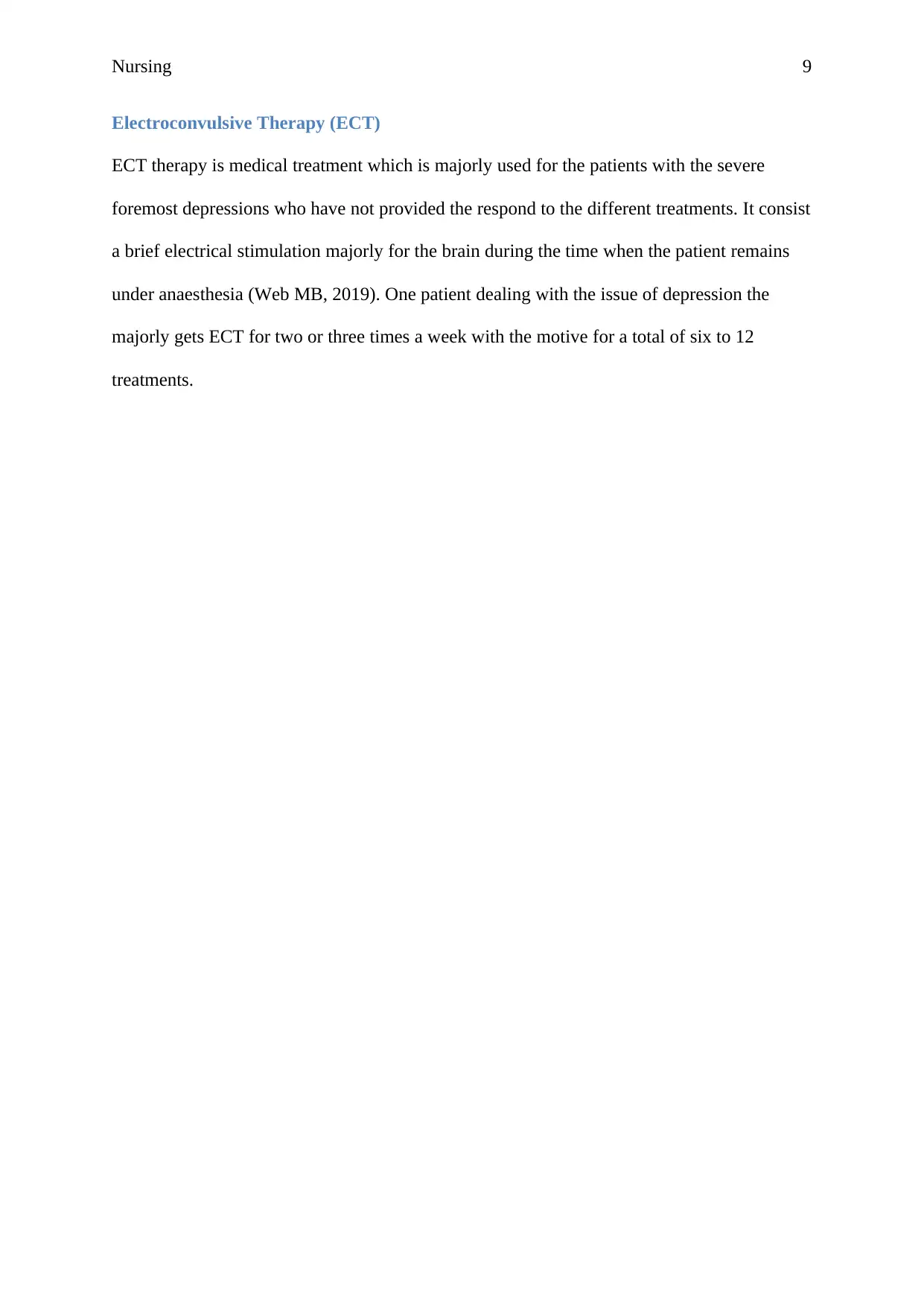
Nursing 9
Electroconvulsive Therapy (ECT)
ECT therapy is medical treatment which is majorly used for the patients with the severe
foremost depressions who have not provided the respond to the different treatments. It consist
a brief electrical stimulation majorly for the brain during the time when the patient remains
under anaesthesia (Web MB, 2019). One patient dealing with the issue of depression the
majorly gets ECT for two or three times a week with the motive for a total of six to 12
treatments.
Electroconvulsive Therapy (ECT)
ECT therapy is medical treatment which is majorly used for the patients with the severe
foremost depressions who have not provided the respond to the different treatments. It consist
a brief electrical stimulation majorly for the brain during the time when the patient remains
under anaesthesia (Web MB, 2019). One patient dealing with the issue of depression the
majorly gets ECT for two or three times a week with the motive for a total of six to 12
treatments.
Paraphrase This Document
Need a fresh take? Get an instant paraphrase of this document with our AI Paraphraser
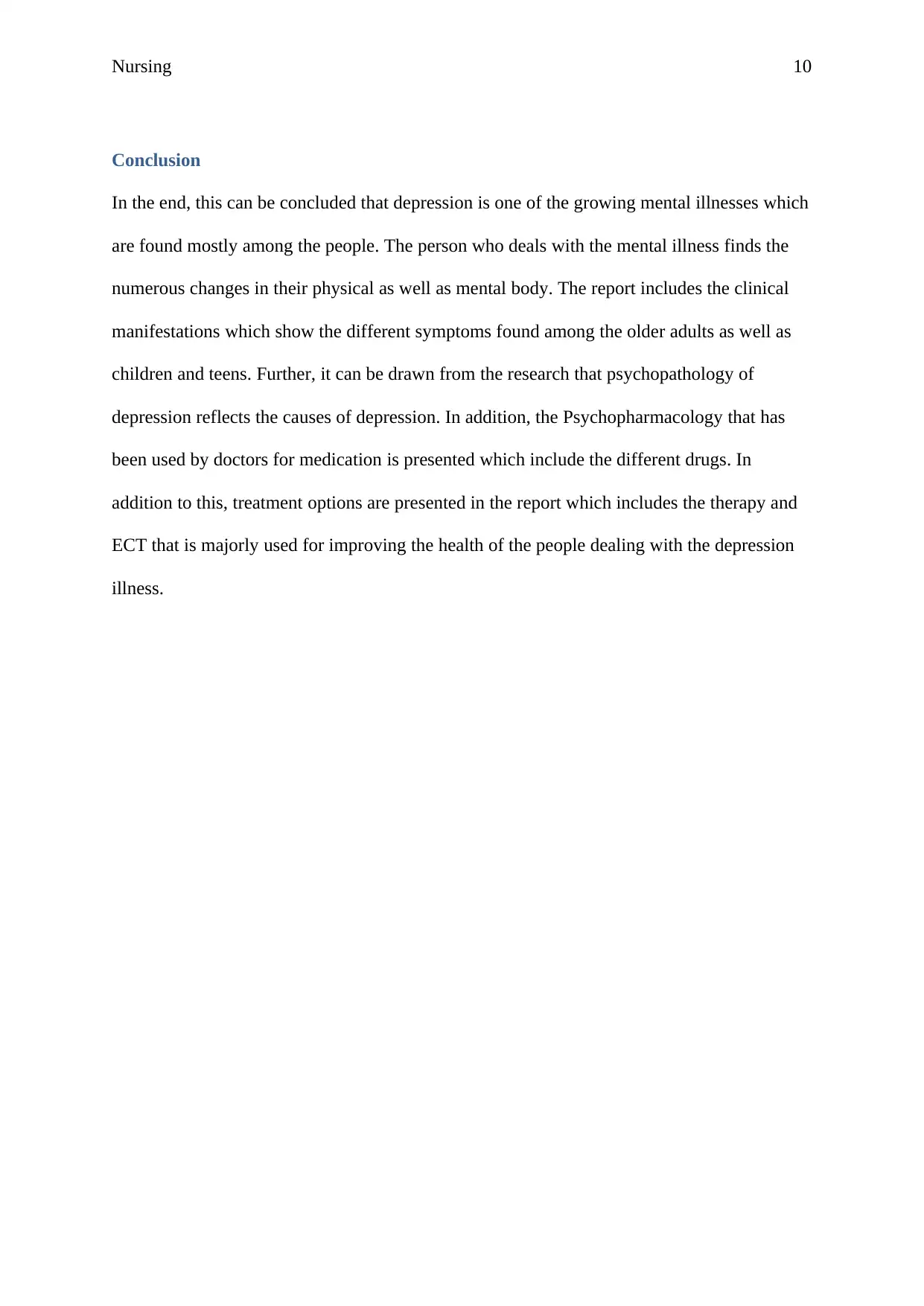
Nursing 10
Conclusion
In the end, this can be concluded that depression is one of the growing mental illnesses which
are found mostly among the people. The person who deals with the mental illness finds the
numerous changes in their physical as well as mental body. The report includes the clinical
manifestations which show the different symptoms found among the older adults as well as
children and teens. Further, it can be drawn from the research that psychopathology of
depression reflects the causes of depression. In addition, the Psychopharmacology that has
been used by doctors for medication is presented which include the different drugs. In
addition to this, treatment options are presented in the report which includes the therapy and
ECT that is majorly used for improving the health of the people dealing with the depression
illness.
Conclusion
In the end, this can be concluded that depression is one of the growing mental illnesses which
are found mostly among the people. The person who deals with the mental illness finds the
numerous changes in their physical as well as mental body. The report includes the clinical
manifestations which show the different symptoms found among the older adults as well as
children and teens. Further, it can be drawn from the research that psychopathology of
depression reflects the causes of depression. In addition, the Psychopharmacology that has
been used by doctors for medication is presented which include the different drugs. In
addition to this, treatment options are presented in the report which includes the therapy and
ECT that is majorly used for improving the health of the people dealing with the depression
illness.
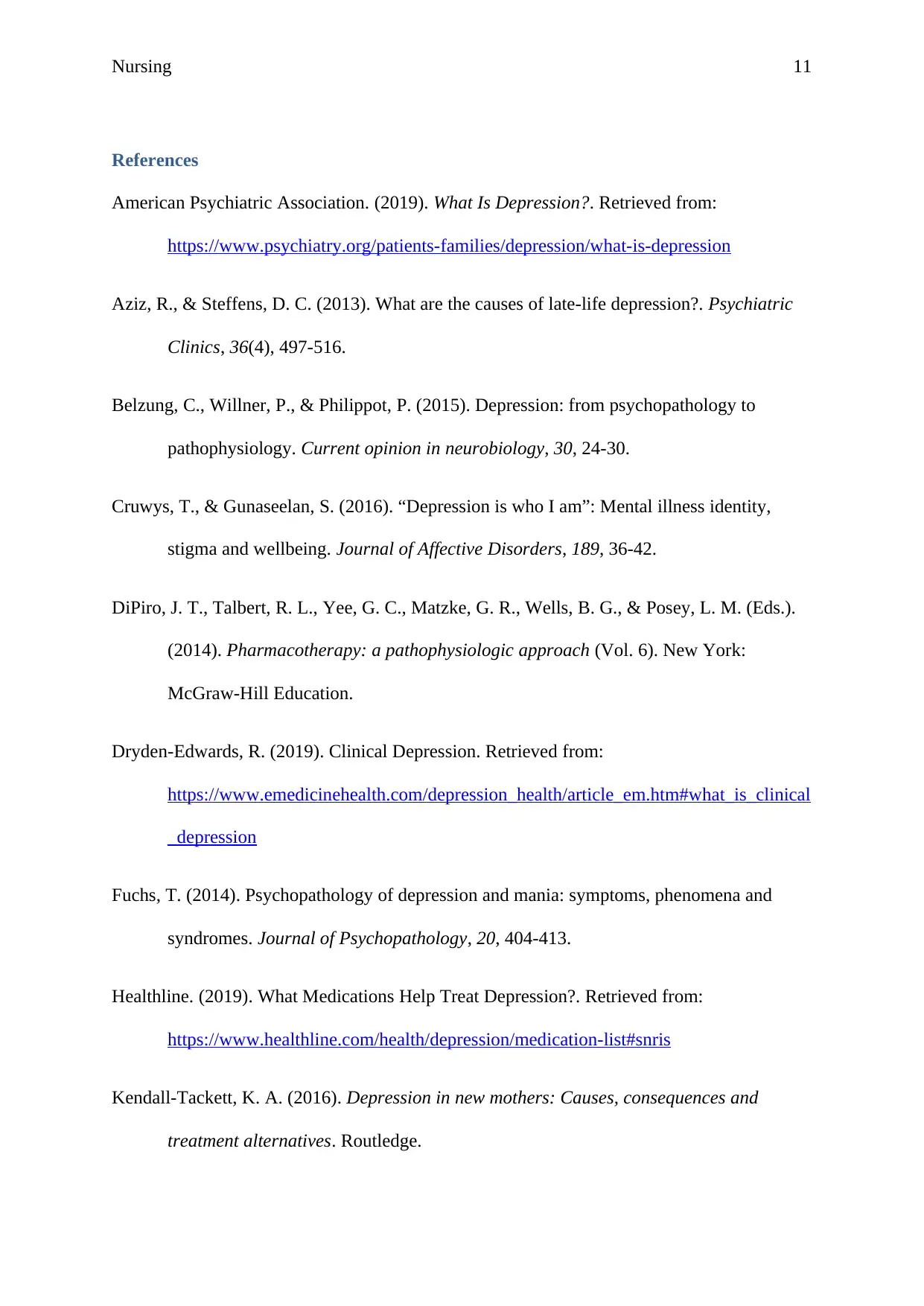
Nursing 11
References
American Psychiatric Association. (2019). What Is Depression?. Retrieved from:
https://www.psychiatry.org/patients-families/depression/what-is-depression
Aziz, R., & Steffens, D. C. (2013). What are the causes of late-life depression?. Psychiatric
Clinics, 36(4), 497-516.
Belzung, C., Willner, P., & Philippot, P. (2015). Depression: from psychopathology to
pathophysiology. Current opinion in neurobiology, 30, 24-30.
Cruwys, T., & Gunaseelan, S. (2016). “Depression is who I am”: Mental illness identity,
stigma and wellbeing. Journal of Affective Disorders, 189, 36-42.
DiPiro, J. T., Talbert, R. L., Yee, G. C., Matzke, G. R., Wells, B. G., & Posey, L. M. (Eds.).
(2014). Pharmacotherapy: a pathophysiologic approach (Vol. 6). New York:
McGraw-Hill Education.
Dryden-Edwards, R. (2019). Clinical Depression. Retrieved from:
https://www.emedicinehealth.com/depression_health/article_em.htm#what_is_clinical
_depression
Fuchs, T. (2014). Psychopathology of depression and mania: symptoms, phenomena and
syndromes. Journal of Psychopathology, 20, 404-413.
Healthline. (2019). What Medications Help Treat Depression?. Retrieved from:
https://www.healthline.com/health/depression/medication-list#snris
Kendall-Tackett, K. A. (2016). Depression in new mothers: Causes, consequences and
treatment alternatives. Routledge.
References
American Psychiatric Association. (2019). What Is Depression?. Retrieved from:
https://www.psychiatry.org/patients-families/depression/what-is-depression
Aziz, R., & Steffens, D. C. (2013). What are the causes of late-life depression?. Psychiatric
Clinics, 36(4), 497-516.
Belzung, C., Willner, P., & Philippot, P. (2015). Depression: from psychopathology to
pathophysiology. Current opinion in neurobiology, 30, 24-30.
Cruwys, T., & Gunaseelan, S. (2016). “Depression is who I am”: Mental illness identity,
stigma and wellbeing. Journal of Affective Disorders, 189, 36-42.
DiPiro, J. T., Talbert, R. L., Yee, G. C., Matzke, G. R., Wells, B. G., & Posey, L. M. (Eds.).
(2014). Pharmacotherapy: a pathophysiologic approach (Vol. 6). New York:
McGraw-Hill Education.
Dryden-Edwards, R. (2019). Clinical Depression. Retrieved from:
https://www.emedicinehealth.com/depression_health/article_em.htm#what_is_clinical
_depression
Fuchs, T. (2014). Psychopathology of depression and mania: symptoms, phenomena and
syndromes. Journal of Psychopathology, 20, 404-413.
Healthline. (2019). What Medications Help Treat Depression?. Retrieved from:
https://www.healthline.com/health/depression/medication-list#snris
Kendall-Tackett, K. A. (2016). Depression in new mothers: Causes, consequences and
treatment alternatives. Routledge.
⊘ This is a preview!⊘
Do you want full access?
Subscribe today to unlock all pages.

Trusted by 1+ million students worldwide
1 out of 13
Related Documents
Your All-in-One AI-Powered Toolkit for Academic Success.
+13062052269
info@desklib.com
Available 24*7 on WhatsApp / Email
![[object Object]](/_next/static/media/star-bottom.7253800d.svg)
Unlock your academic potential
Copyright © 2020–2026 A2Z Services. All Rights Reserved. Developed and managed by ZUCOL.





